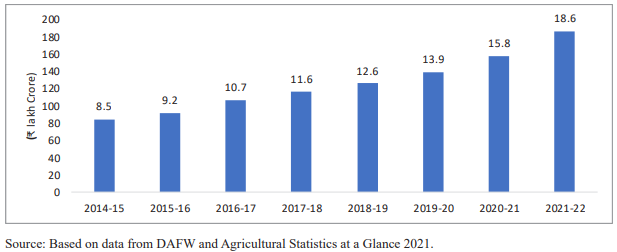Ministry of Finance
AGRICULTURE SECTOR REMAINS BUOYANT WITH 4.6 PERCENT ANNUAL GROWTH DURING LAST SIX YEARS
2021-22 AGRI EXPORTS REACH AN ALL TIME HIGH OF USD 50.2 BILLION
INCREASING MSP, GROWING AGRI CREDIT, INCOME SUPPORT SCHEMES AND AGRI INSURANCE AMONG KEY FACTORS PROMOTING THE SECTOR
Posted On:
31 JAN 2023 1:21PM by PIB Delhi
India’s agriculture sector has been witnessing robust growth with an average annual growth rate of 4.6 per cent over the last six years. This has enabled agriculture and allied activities sector to contribute significantly towards country’s overall growth, development and food security, says the Economic Survey 2022-23 tabled in the Parliament by the Union Minister of Finance and Corporate Affairs Smt. Nirmala Sitharaman here today. Further in recent years the country has emerged as the net exporter of agricultural products, with exports in 2021-22 touching a record US $ 50.2 billion.
The Survey attributes the sector’s growth and buoyancy to the “measures taken by the government to augment crop and livestock productivity, ensure certainty of returns to the farmers through price support (Minimum Support Price), promote crop diversification” and, focused interventions to “enhance credit availability, facilitate mechanisation and boost horticulture and organic farming”. The Survey observes that these interventions are in line with the recommendations of the Committee on Doubling of Farmers’ Income.
Minimum Support Price (MSP) to Ensure Returns Over Cost of Production
The Government has been increasing the MSP for all 22 Kharif, Rabi and other commercial crops with a margin of at least 50 per cent over the all-India weighted average cost of production since the agricultural year 2018-19, says the Survey. Relatively higher MSP was given to pulses and oilseeds in order to keep pace with the changing dietary patterns and achieve the goal of self-sufficiency.
Enhanced Access to Agricultural Credit
The Government has set a target of ₹18.5 lakh crores in agricultural credit flow in 2022-23. The Government had consistently increased this target every year and it has also been able to continuously surpass the target set every year over the past several years. In 2021-22, it was about 13 per cent more than the target of ₹16.5 lakh crores.

The survey suggests, this achievement was made possible because the Government had designed multitude of initiatives to ensure hassle-free credit availability to farmers at a competitive interest rates - Kisan Credit Card (KCC) Scheme which provides credit at any time, and Modified Interest Subvention Scheme which provides short term agricultural loan up to ₹3 lakhs at subsidized interest rate.
Kisan Credit Cards have been issued to 3.89 crore eligible farmers with a KCC limit of ₹4,51,672 crore as on December 2022. With the Government of India extending the KCC facility to fisheries and animal husbandry farmers in 2018-19, now over 1.0 lakh (as on 17th October 2022) KCCs have been sanctioned for the fisheries sector and 9.5 lakh (as of 4 November 2022) for the animal husbandry sector.
Income and Risk Support
The Survey points out that 11.3 crore farmers received income support from the Government under the April-July 2022-23 cycle of PM KISAN. The scheme, over the past three years has provided assistance worth more than ₹2 lakh crores to the needy farmers. An empirical study by the Indian Council of Agriculture Research (ICAR) and the International Food Policy Research Institute (IFPRI) found that the scheme has helped address the liquidity constraints of farmers for buying agricultural inputs, helped specifically the small and marginal farmers to meet their daily consumption, education, health and other incidental expenses.
Pradhan Mantri Fasal Bima Yojna is currently the largest crop insurance scheme in the world in terms of farmer enrolments, averaging 5.5 crore applications every year and the third largest in terms of the premium received, notes the survey. During the last six years of its implementation, farmers paid a premium of ₹25,186 crore and received claims amounting to ₹1.2 lakh crore (as of 31 October 2022). The Survey notes that the acceptability of the scheme amongst the farmer can be ascertained from the fact that the share of non-loanee, marginalised, and small farmers have increased by 282 per cent since the scheme’s inception in 2016.
Farm Mechanisation – Key to Unlock the Productivity
With the average size of household ownership farm holdings seeing a downward trend, the Economic Survey suggests that machines that are viable and efficient for small farm holdings are the key to increase the productivity. Under the Sub Mission on Agricultural Mechanisation (SMAM), of 21,628 Custom Hiring Centres, 467 Hi-Tech hubs and 18306 farm machinery banks have been established as on December 2022, besides assisting state governments with training and demonstration of agricultural machinery use. Farm mechanisation additionally also reduces the cost of cultivation and the drudgery associated with farm operations notes the Survey.
Organic and Natural Farming
India has the highest number of organic farmers in the world at 44.3 lakhs, and 59.1 lakh ha area has been brought under organic farming by 2021-22, says the Survey. Organic and natural farming provides chemical and pesticide free food grains and crops, improves soil health and reduces environmentally pollution.
The Government has been promoting organic farming by two dedicated schemes viz., Paramparagat Krishi Vikas Yojana (PKVY) and Mission Organic Value Chain Development for North Eastern Region (MOVCDNER) through cluster and Farmer Producer Organisations formation. Under PKVY, 32,384 clusters totaling 6.4 lakh ha area and 16.1 lakh farmers have been covered as of November 2022. Likewise, under MOVCDNER, 177 FPOs/FPCs have been created, covering 1.5 lakh farmers and 1.7 lakh hectares to promote organic farming of niche crops in the North East Region.
Under Bhartiya Prakratik Krishi Paddhati (BPKP), a scheme to help farmers adopt all forms of traditional/ecological farming practices including Zero-Budget Natural Farming (ZBNF), 4.09 lakh hectares of land have been brought under natural farming in eight states.
***
RM/NR/KAK
(Release ID: 1894900)
Visitor Counter : 15922